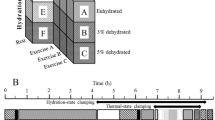Summary
In order to investigate the effects of vasopressin (ADH) on evaporative weight loss during heat exposure, four modifications of a single experiment were used. In all experiments the subjects (co-authors) initially ingested an amount of tap water equal to 2% of their body weight. During 3 out of 4 experiments urinary and evaporative weight loss was replenished at 15 min intervals while no further water was ingested in the 4th experiment. Following a 2 hr period at room temperature (25–27.8°C), the subjects entered the heat chamber maintained at 43–44°C D. B., 28–29°C W. B. Heat exposure for 3 experiments lasted 2 hrs, while for a 4th exposure the time lapse was 4 hrs. Vasopressin (5 units) was injected intramuscularly at the beginning of the last hour of heat exposure in two experiments wherein water replacement took place. Vasopressin injection had no apparent effect on rates of evaporative weight loss. For these experiments the effects of exercise, hypohydration and probably subject anxiety could be ruled out as influencing these results.
Similar content being viewed by others
References
Collins, K. J.: The action of exogenous aldosterone on the secretion and composition of drug-induced sweat. Clin. Sci.30, 207–221 (1966).
Fasciolo, J. C., G. L. Totel, andR. E. Johnson: Anti-diuretic hormone and human eccrine sweating. Fed. Proc.28, 528 (1969).
Hankiss, J.: Effect of anti-diuretic hormone on sweating as proof of its extrarenal action. Amer. J. med. Sci.238, 452–455 (1959).
Hellmann, K., andJ. S. Weiner: Antidiuretic substances in urine following exposure to high temperatures. J. appl. Physiol.6, 194–198 (1953).
Itoh, S.: The release of antidiuretic hormone from the posterior pituitary body in exposure to heat. Jap. J. Physiol.4, 185–190 (1954).
Ladell, W. S. S.: The effect of pituitrin upon performance in moderate heat. S. Afr. J. med. Sci.13, 145–150 (1948).
—: Terrestrial animals in humid heat: man. In: Handbook of physiology, Adaptation to the environment. Washington, D. C.: Am. Physiol. Soc. 1964, sect. 4, chapt.39, pp. 625–659.
—, andH. W. Whitcher: The effect of pituitrin on sweating. J. Physiol. (Lond.)154, 44P-45P (1960).
Macfarlane, W. V., andK. W. Robinson: Seasonal changes in plasma antidiuretic activity produced by a standard heat stimulus. J. Physiol. (Lond.)135, 1–11 (1957).
Pearcy, M., S. Robinson, D. I. Miller, J. T. Thomas, Jr., andJ. de Brota: Effects of dehydration, salt depletion and pitressin on sweat rate and urine flow. J. appl. Physiol.8, 621–626 (1956).
Ratner, A. C., andR. L. Dobson: The effect of antidiuretic hormone on sweating. J. invest. Dermat.43, 379–381 (1964).
Robinson, K. W., andW. V. Macfarlane: The influence of environmental temperature on the level of plasma anti-diuretic substances in the rat. Aust. J. Biol. Sci.9, 130–138 (1956).
——: Urinary excretion of adrenal steroids during exercise in hot atmospheres. J. appl. Physiol.12, 13–16 (1958).
Robinson, S., J. R. Nicholas, J. H. Smith, W. J. Daly, andM. Pearcy: Time relation of renal and sweat gland adjustments to salt deficiency in men. J. appl. Physiol.8, 159–165 (1955).
Senay, L. C., Jr., andM. L. Christensen: Changes in blood plasma during progressive dehydration. J. appl. Physiol.20, 1136–1140 (1965).
——: Evaporative weight loss during progressive dehydration. Fed. Proc.25, 211 (1966).
——: Variations of certain blood constituents during actue heat exposure. J. appl. Physiol.24, 302–309 (1968).
Streeten, D. H. P., J. W. Conn, L. H. Louis, S. S. Fajans, H. S. Seltzer, R. D. Johnson, R. D. Gittler, andA. H. Dube: Secondary alodsteronism. Metabolic and adrenocortical responses of normal men to high environmental temperatures. Metabolism.9, 1071–1092 (1960).
Tepperman, J.: Metabolic and endocrine physiology, 2 Ed. pp. 42–43. Chicago: Year Book Medical Pub. 1968.
Author information
Authors and Affiliations
Additional information
This work was supported by N. I. H. grants 5 RO1 HE-07075 and 1K3 HE 25,110
Rights and permissions
About this article
Cite this article
Senay, L.C., van Beaumont, W. Antidiuretic hormone and evaporative weight loss during heat stress. Pflugers Arch. 312, 82–90 (1969). https://doi.org/10.1007/BF00588533
Received:
Issue Date:
DOI: https://doi.org/10.1007/BF00588533




